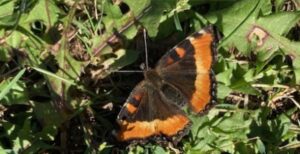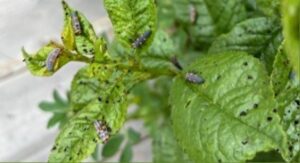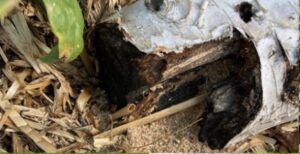March 26, 2025
By the Camrose Environmental Sustainability Group

You’ve probably heard “leave the leaves” for your garden in the fall. Did you know that too early a start on Spring cleaning can have negative effects on the insects we rely on for a healthy garden and a healthy world?
If you can manage, it is actually most beneficial to not clean up your garden at all!
Apparently, insects don’t all emerge at the same time; some continue to develop within the shelter of fallen leaves throughout the spring and summer, so many experts recommend that we leave the leaves permanently.
 Leaving leaves, tree needles, cones, and twigs in the garden boosts biodiversity by creating and maintaining essential habitat for all kinds of beneficial pollinators and soil boosting critters. If you can, consider redefining what it means to clean up your garden in spring. Instead of removing all leaves, etc., and putting them in your compost, you can simply move some of them elsewhere in your garden or yard.
Leaving leaves, tree needles, cones, and twigs in the garden boosts biodiversity by creating and maintaining essential habitat for all kinds of beneficial pollinators and soil boosting critters. If you can, consider redefining what it means to clean up your garden in spring. Instead of removing all leaves, etc., and putting them in your compost, you can simply move some of them elsewhere in your garden or yard.
Whenever possible, avoid using leaf blowers or leaf shredders because these tools disturb leaves where insects are sheltering or living, or of course can harm or kill the insects.
In addition to sheltering small critters, fallen ground cover helps retain moisture, prevent soil erosion, and add organic matter to the soil as it breaks down. Save money and labour by not filling your green bin over and over, or later buying and spreading yards of mulch.

Typically, when we clean up our gardens, we cut back perennials to ground level. Instead, if you cut pithy or hollow plant stems to 12-15 inches, they can be used as cavity nests by solitary bees.
New plant growth will soon cover the awkward stems in the garden. Again, instead of putting old plant stems and other debris into your green bin, perhaps drop them on the ground or move thick woody stems to the back of the garden.
*Photo Credits: Judith Cucheran
_______________________________________________________________________________________________________________________________________
By rethinking what it means to “clean” your garden, you can contribute to a healthier, more vibrant ecosystem. Learn more about preparing your yard for spring by reading the Camrose Environmental Sustainability Advisory Committee’s article on page 15 in the Camrose Booster.